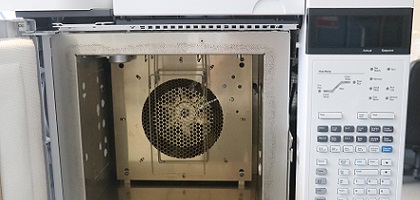Modules
Webcasts
- 20 Steps to a Reliable Mobile Phase - Q & A
- CHROMtalks - Fundamentals and Principles of Extra Column Band Broadening in UHPLC: A Tutorial
- The Rights and Wrongs of Mobile Phase Preparation Q&A
- The Rights and Wrongs of Mobile Phase Preparation
- 20 Steps to a Reliable HPLC Mobile Phase
- + VIEW MORE WEBCASTS
Video Courses
Modules
Webcasts
- Leveraging Optimal Performance of Charged Aerosol Detection Through Optimization and Troubleshooting Techniques
- What HPLC Operators Need to Know Part 1: Everything Needed to Understand Mobile Phase Pumping Systems
- Everything You Need to Know About UV Detectors for HPLC
- HPLC Detectors – What, Where, When, and How
- Everything You Should Know About UV Detection for HPLC
- + VIEW MORE WEBCASTS
Webcasts
- HPLC Column Troubleshooting - Can We Fix It?
- Troubleshooting HPLC Mobile Phase Issues - Q&A
- CHROMtalks - The Top Seven Autosampler Problems and How to Avoid Them
- CHROMtalks - Listen to Your LC Instrument - It Is Trying to Tell You Something!
- CHROMtalks - Essentials of LC Troubleshooting - Some Problems Just Never Go Away
- + VIEW MORE WEBCASTS
Modules
Webcasts
- Top Ten Tips for HILIC Method Development and Optimization
- CHROMtalks - (More) Steps Toward Easier Method Development for Two-Dimensional Liquid Chromatography
- CHROMtalks - A Simple Approach to LC Method Development
- CHROMtalks - Beyond the HPLC Column: Understanding Non-Column Factors That Influence Peak Widths and Shapes in High-Efficiency Separations
- CHROMtalks - A Generic Methodology for Streamlined Performance Monitoring of a Wide Range of Reversed Phase UHPLC Columns Over Time
- + VIEW MORE WEBCASTS
Video Courses
Modules
Modules
Video Courses
Modules
Webcasts
- CHROMtalks - Optimizing Sample Introduction in GC through Focusing Techniques and Appropriate Inlet Selection
- Principles of Operation, Maintenance, and Troubleshooting for Sulfur and Nitrogen Chemiluminescence Detectors with Gas Chromatography
- CHROMtalks - GC Sample Introduction - The Achilles Heel of GC
- CHROMtalks - Qualifying and Optimizing GC Instruments and Methods in High-Throughput Regulated Laboratories
- CHROMtalks - Detecting It All - Keeping Your Response Consistent with Common GC Detectors
- + VIEW MORE WEBCASTS
Webcasts
- CHROMtalks - Troubleshooting GC Sample Introduction
- CHROMtalks - GC Troubleshooting in Five Simple Pictures
- CHROMtalks - Hidden Errors and Mistakes that Make Your GC Results Look Better than They Really Are
- GC Troubleshooting - Gas Supply and Inlet Issues
- GC Troubleshooting in 20 Pictures - Part I
- + VIEW MORE WEBCASTS
Webcasts
- CHROMtalks - Comprehensive Two-Dimensional Gas Chromatography: Tips on Method Optimization
- CHROMtalks - Using Classical Discussions of Separation in Gas Chromatography to Make Our Methods More Efficient and Greener
- CHROMtalks - GCxGC: It’s Not That Hard - Really!
- CHROMtalks - GC Column Selection: The Three Most Important Parameters to Consider
- Choosing the Right GC Column - The Most Important Choice You Will Ever Make
- + VIEW MORE WEBCASTS
Video Courses
Modules
Modules
Modules
Webcasts
- CHROMtalks - Elevating Analytical Excellence: Innovations in Method Development with Automated Sample Preparation (Part 2)
- CHROMtalks - Elevating Analytical Excellence: Innovations in Method Development with Automated Sample Preparation (Part 1)
- CHROMtalks - Sample Preparation Techniques Used in LC Method Development
- Improved Speed of Extractables Studies Using Accelerated Solvent Extraction and LC-MS
- Top Tips to Improve Reproducibility and Sensitivity in Solid Phase Extraction
- + VIEW MORE WEBCASTS
Modules
Webcasts
Video Courses
Video Courses
Webcasts
Modules
Modules
Webcasts
Modules
Quick Guides
Webcasts
Webcasts
Webcasts
- Introduction to Chromatographic Characterization of Proteins
- HPLC Analysis of Oligonucleotides
- LC/MS MAM Analysis of Adeno-Associated Virus Particles
- CHROMtalks - Tips and Tricks for Contemporary LC Separations of Biomolecules
- In-depth Characterization of Biopharmaceuticals by Multidimensional LC-MS
- + VIEW MORE WEBCASTS
Webcasts
- Advanced Column Selection and Method Optimization for Biomolecular Purification and Characterization
- Unlock Efficiency and Simplify Scale-Up with AdvanceBio Oligonucleotide Columns: From Analytical to Preparative Purification
- CHROMtalks - The Use of Machine Learning to Automate Method Development for LC Separations of Biopharmaceuticals
- Upgrading Your Aggregate Analysis of Viral Vectors with Novel Wide Pore SEC Columns
- From Struggles to Solutions: Strategies for Overcoming Oligonucleotide Challenges
- + VIEW MORE WEBCASTS
Modules

